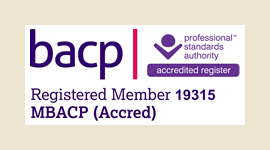

![]() I can offer Zoom video counselling sessions both nationally and internationally.
I can offer Zoom video counselling sessions both nationally and internationally.
Alan Neeld MBACP (Accred) is a qualified Counsellor / Psychotherapist and an accredited member of the BACP (British Association for Counselling and Psychotherapy) and UKRCP (United Kingdom Register of Counsellors and Psychotherapists).
Alan volunteers at Marie Curie in Solihull as a way to give back. Find out more
here ![]()

Bereavement
When someone close to us dies, it can be one of the most overwhelming and distressing experiences that we will ever have to cope with. Most of us go through life without giving too much thought to death and dying and so when it happens, it can catch us feeling totally unprepared. Even if we know that someone is going to die some time beforehand and there is time to prepare as well as possible, it is sometimes difficult to anticipate the overwhelming intensity of feelings and emotions that can follow.
There is no right or wrong way to experience the grieving process. How we respond to the death of a person, the way we feel, the intensity of our emotions and how we move through the grieving process is completely individual.
Getting Support
It is important to get adequate support during the grieving process. It is especially important to be able to talk to people such as family and friends about what we are feeling. This can be a challenging time for those people who tend not to talk about themselves and to bottle things up. Some people may try and avoid what they are feeling by filling every moment of their time with activities like overworking, socialising, drinking and smoking.
It is really important at some stage to take the time to allow ourselves to feel our loss and the effect that is has on us. It is only through this process of feeling our loss and expressing what we are feeling, that we can begin to accept what has happened and move on in a way that enables us to fully reinvest ourselves back into our lives.
Feelings, experiences and behaviours may include:
| Shock | Denial | Anxiety and panic | Sadness | Helplessness | Anger and rage | Guilt | Loneliness | Change in appetite | Regret | Numbness | Withdrawing socially | Yearning | Irritability | Searching for the deceased | Relief | Sleeping problems |
Everybody needs to grieve in their own time and in their own way. Grieving can be a long process and can take from 1 to 2 years to feel that life is getting back to normal or longer if the relationship with the deceased was a complicated one.
Counselling and psychotherapy can be very useful for those people who find it difficult to talk about their feelings or who feel stuck in their grieving process in some way.
The purpose of therapy is to help the person to come to terms with their bereavement and to help them work through their feelings of pain and loss. It is also to help the person find a way of adjusting to life in a world without the deceased and moving on in a way that integrates their loss in a meaningful way.
There is no definitive answer to when the grieving process has finished. However, most people find that there comes a stage when they can think about the person they have lost without feeling pain. This does not mean that the person has forgotten the deceased or will not feel sadness, it just means that the intense, overwhelming pain that marked the significance of their loss and interrupted their ability to enjoy life, has now passed.
Some of the more common issues Alan works with are:-
Stress ![]()
Depression ![]()
Anxiety ![]()
Self Esteem ![]()
Bereavement ![]()
Relationship Issues ![]()
Alan also works with many other issues such as self harm, grief and bereavement, anger issues, abuse and sexual problems.
Please contact Alan ![]() if you have any questions or to book an appointment.
if you have any questions or to book an appointment.
